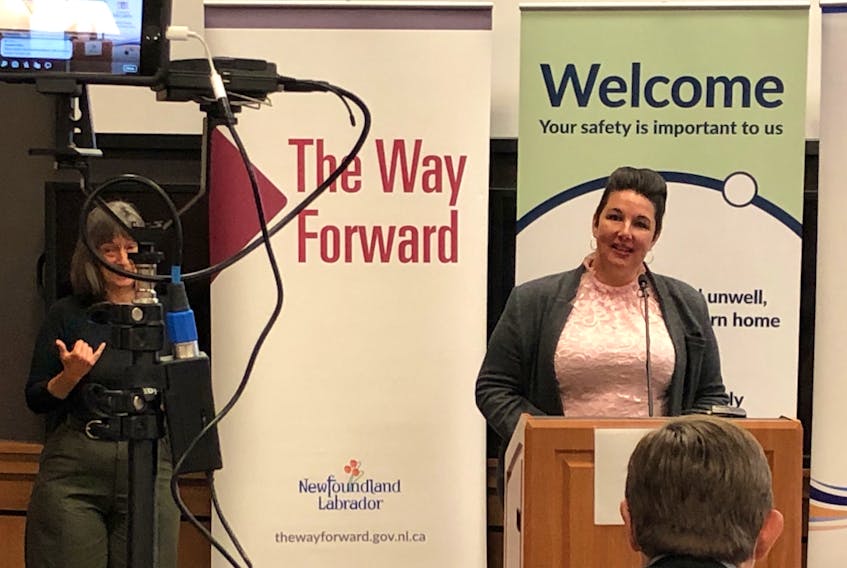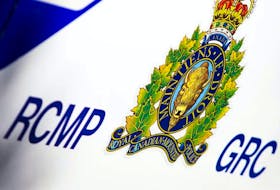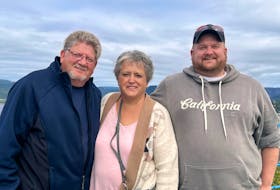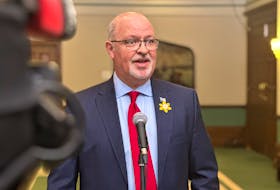ST. JOHN'S, N.L. — Peter Jackson
Local Journalism Initiative Reporter
@pjackson_nl
Paula Corcoran has trouble hiding her enthusiasm when talking about recent mental-health care announcements in Newfoundland and Labrador.
“In case you haven’t guessed, I’m super excited about it,” she said Thursday.
Corcoran, executive director of CHANNAL, explained how the launch of new mental-health teams in the province will help people with mental-health concerns right in their own communities.
They’re called FACT teams, which stands for flexible assertive community treatment.
Starting in August and September, the regional health authorities will launch the teams throughout Newfoundland and Labrador.
But as Corcoran explained, it’s really an expansion of something that already exists, since there have been ACT teams around the province for about 10 years.
“Basically, we’ve made the assertive community treatment teams more flexible,” she said in explaining the acronym.
The difference is that an ACT team normally helps someone who has already been in the mental-health care system, she said, whereas the FACT team could help someone with something as simple as a medication change.
The teams can include members from as many as 10 different disciplines, including peer support.
In a news release Thursday, the Department of Health said seven teams will be available across the province beginning on Aug. 3 in Deer Lake, Corner Brook, St. Anthony and Happy Valley-Goose Bay. Teams in Grand Falls-Windsor and Gander will follow on Aug. 6. A St. John’s team will be available in early September.
Officials hope another six teams will be up and running by the end of 2020.
More than 200 staff will work on these teams, and have received FACT training over the last several months, the department said.
Corcoran emphasized that training is a key element of peer support.
Peer support is a relatively new phenomenon, she said, and a number of independent groups have sprung up in recent years.
“That’s actually a good thing,” she said. “However, at CHANNAL, and with these FACT teams that are being implemented, we want to highlight that we’re actually utilizing standardized, trained peer supporters.”
This is important because simply sharing experiences and commiserating informally does not mean a constructive outcome will be achieved, she said.
Grousing with friends is one thing, she said.
“In a clinical setting, you do need to up the bar.”
Toward recovery
Thursday’s announcement was the second mental-health development this week.
On Tuesday, the province announced it awarded a contract to a consortium called Avalon Healthcare Partnership to build a replacement for the Waterford Hospital on the grounds of the Health Sciences Centre in St. John’s.
It’s one of the goals of an all-party initiative called Towards Recovery, unveiled three years ago, which aims to renew mental-health and addictions services in the province.
At Tuesday’s announcement, Health Minister Dr. John Haggie said the new $330-million facility, to be completed in 2024, is only one part of a larger equation.
“What we’re doing is making a new, made-in-Newfoundland-and-Labrador blend where we have a solid foundation based in community, with low-barrier, easy-access, no-appointment walk-in, and at the other end, the top of the steps in the step care approach, will be intensive treatment in places like the new adult mental-health facility,” he said.
Referrals to FACT teams can be made by anyone seeking help, general practitioners, psychiatrists, family members or a community agency. For assistance, people can call their local community mental-health and addictions office or 811, or go online to www.bridgethegapp.ca.
Peter Jackson is a Local Journalism Initiative reporter covering health for The Telegram









